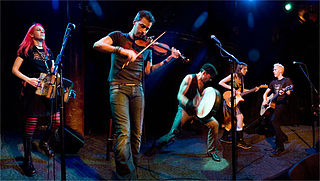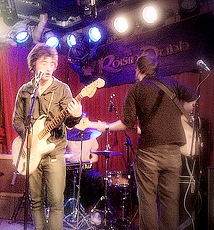In the music of Ireland, Irish rebel songs refer to folk songs which are primarily about the various rebellions against English Crown rule. Songs about prior rebellions are a popular topic of choice among musicians which supported Irish nationalism and republicanism. In the 20th and 21st centuries, Irish rebel songs focus on physical force Irish republicanism in the context of the Troubles in Northern Ireland.

Blood Axis are an American band, made up of journalist and author Michael Moynihan, music producer Robert Ferbrache, and musician and author Annabel Lee.
"Follow Me Up to Carlow" is an Irish folk song celebrating the defeat of an army of 3,000 English soldiers by Fiach Mac Aodh Ó Broin at the Battle of Glenmalure, during the Second Desmond Rebellion in 1580.
"Foggy Dew" or "Foggy, Foggy Dew" is an English folk song with a strong presence in the South of England and the Southern United States in the nineteenth century. The song describes the outcome of an affair between a weaver and a girl he courted. It is cataloged as Laws No. O03 and Roud Folk Song Index No. 558. It has been recorded by many traditional singers including Harry Cox, and a diverse range of musicians including Benjamin Britten, Burl Ives, A.L. Lloyd and Ye Vagabonds have arranged and recorded popular versions of the song.
Jag Panzer is an American power metal band from Colorado Springs, Colorado, United States.

Culann's Hounds are a traditional Irish folk band from San Francisco, California, United States. Founded in 1999 by Steve Gardner and Michael Kelleher as The Irish Bastards, the band began playing gigs and soon adopted the more broadly appealing name.
"Morning Dew," also known as "(Walk Me Out in the) Morning Dew," is a contemporary folk song by Canadian singer-songwriter Bonnie Dobson. The lyrics relate a fictional conversation in a post-nuclear holocaust world. Originally recorded live as a solo performance, Dobson's vocal is accompanied by her finger-picked acoustic guitar playing.

Derek Warfield is an Irish singer, songwriter, historian, and a former member of the musical group The Wolfe Tones.
Róisín, sometimes anglicized as Roisin or Rosheen, is an Irish female given name, meaning "little rose". The English equivalent is Rose, Rosaleen or Rosie.
The Flying Column was the name of a Belfast folk group formed around 1967/68 who took their name from the Active Service Units of the Irish Republican Army that fought throughout Ireland during the War of Independence.
"Greenland Whale Fisheries" is a traditional sea song. In most of the versions collected from oral sources, the song opens up giving a date for the events that it describes. However, the song is actually older than this and a form of it was published as a ballad before 1725. It has been given a Roud number of 347.

"Róisín Dubh", written in the 16th century, is one of Ireland's most famous political songs. It is based on an older love-lyric which referred to the poet's beloved rather than, as here, being a metaphor for Ireland. The intimate tone of the original carries over into the political song. It is often attributed to Antoine Ó Raifteiri, but almost certainly predates him.

The Róisín Dubh is a live music and comedy venue located in Galway, Ireland. It has hosted events such as the IMRO Showcase Tour and the 2fm 2moro 2our. The name translates from the Irish language as the "little black rose". According to Una Mullally in the Sunday Tribune, the venue is "the heart of live music in the city".
"Foggy Dew" is the name of several Irish ballads, and of an Irish lament. The song chronicles the Easter Rising of 1916, and encourages Irishmen to fight for the cause of Ireland, rather than for the British Empire, as so many young men were doing in World War I.
Wild Rover is an album by The Dubliners that was released in 2011. The album charted at number 55 in Ireland.

Belt of the Celts is the ninth album by Irish folk and rebel band The Wolfe Tones. The album features political songs such as Some Say the Devil is Dead

The 25th Anniversary album is the fifteenth album by the Irish folk and rebel band The Wolfe Tones, released in 1989 by Shanachie Records. It is both a new studio album and a greatest hits release as it features both new recordings unique to this record and old recordings from previous albums. New recordings include "Broad Black Brimmer" with an electric guitar and drums played during the final verse, "James Connolly", "Banna Strand", "Monsignor Horan", and "Come Out Ye Black and Tans", among others.

St. Beaufort are a three-piece folk band based in Berlin. The members are Henric Hungerhoff, Joseph Jakubczyk, and Tomás Peralta González. Their style has been referred to as being influenced by bluegrass bands mixed with contemporary folk tunes. All musicians are multi-instrumentalists.








